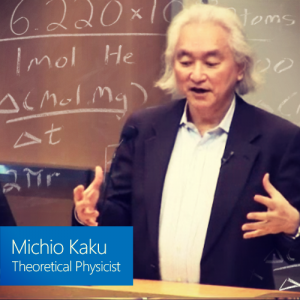Professor Michio Kaku Unlocks the Mysteries of the Brain
 Original article published on Microsoft for Work on March 17, 2014.
Original article published on Microsoft for Work on March 17, 2014.
Leaders in every industry must pay attention to disruptions. Professor Michio Kaku, the co-founder of string field theory and one of America’s foremost physicists, predicts disruptions in education, healthcare, psychology, criminal justice, manufacturing, and entertainment. To ensure your business survives and thrives in a coming radical transformation of the economy, you first need to know what’s on the horizon.
We recently had the rare honor to attend a lecture by Dr. Kaku (full video embedded below), who took us on a stunning tour through the near-future of understanding the brain—and the potential breakthroughs this understanding could allow us to do. These are his thoughts on disruptive technologies that all have the ability to radically transform not only business but life itself.
The human mind: a rough guide
Kaku’s newest book, The Future of the Mind, details the ways in which humanity is beginning to unlock the mysteries of the brain. The BRAIN Initiative, detailed by President Barack Obama in his 2013 State of the Union Address, is a project on par with the Human Genome Project. Where the Human Genome Project mapped every piece of human DNA, the BRAIN Initiative will map every neuron in the brain.
The functional result, Kaku explained, will be a complete understanding of both our physical existence (DNA) and our mental map (our minds). Knowing this is the first step into tapping into some of the amazing advances being made by researchers today in things like Body-Machine Interface (BMI).
We are the ghost in the shell
Scientists have already started to map—and tap into—our neural network to control simple machines. Wounded soldiers can control robotic hands and limbs. Professor Stephen Hawking uses an interface that interprets a combination of his eye movements and cheek motions, and has experimented with interfaces that allow him to speak, using thoughts, through a synthesizer.
These are the first steps into controlling robots (called surrogates) or virtual constructs (avatars) with our minds. The possibilities for this are limitless: exploring harsh environments, from the ocean floor to the vacuum of space, at a fraction of the cost of sending a person. Working in places that normal people could not work. Removing landmines without putting people at risk. The list goes on.
Altered carbon
One of the most exciting developments, according to Kaku, is the possibility that with mapping the brain’s neurons, we could “store” memories and transfer them from one mind to another. Experiments have already shown this might be possible, with scientists “implanting” stored memories in laboratory mice.
It’s a strong argument for the mind as software—which means it could be hacked, copied, and improved. It also means that a person could achieve functional immortality: if the brain could be backed up, stored, and transferred, consciousness could live forever.
Science fact
Dr. Kaku pointed out that these technologies are still years, if not decades, in the future. But the groundwork has been laid for the companies of tomorrow to begin developing this technology. You may not be able to back up your mind yet—but could your company develop the first inexpensive BMI? Tap into organic networks to store more data? Hack the mind with education classes that could be uploaded, Matrix-style? Or something that even Dr. Kaku hasn’t imagined?
Even if your business won’t invent the technologies that shape the future, there is no doubt that it will be influenced and disrupted by them. Dr. Kaku’s book and lecture is a good place to start anticipating tomorrow’s disruptions, today.
Watch the video here: Link
See you in the future.
This post is part of our ongoing coverage of Microsoft Research and its Visiting Speaker Series. Microsoft Research supports its mission to educate and foster innovation and growth through inviting authors and speakers that inspire big ideas, spark new ways of doing things, or help people see things from a new perspective.
